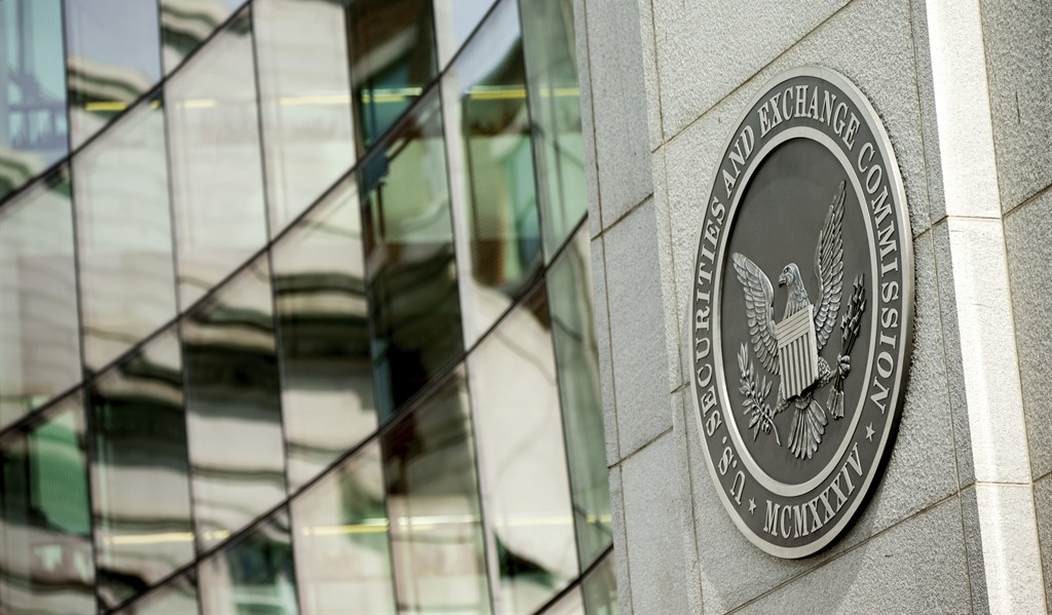Today was another opinion day and while there were no absolute blockbusters, we still think that SEC v. Jarkesy is worth paying attention to—especially for the telling reaction on the left. First, you can read the opinion just by following Mr. Turley’s usual links:
...We have the third case in SEC: https://t.co/oEkyPEGuZE
— Jonathan Turley (@JonathanTurley) June 27, 2024
The issue is whether or not the SEC (the Securities and Exchange Commission) can impose civil penalties for alleged securities fraud without a civil trial before a jury in federal court, as guaranteed by the Seventh Amendment. That amendment reads as follows:
In Suits at common law, where the value in controversy shall exceed twenty dollars, the right of trial by jury shall be preserved, and no fact tried by a jury, shall be otherwise re-examined in any Court of the United States, than according to the rules of the common law.
For years, when the SEC sought civil penalties for securities fraud, they would actually take you to trial, with a jury and all that. But when Congress passed the Dodd Frank Wall Street Reform and Consumer Protection Act, after the 2007-2008 financial crisis, that law basically said, ‘we don’t need all that stinkin' due process and fair trial stuff! Let’s impose penalties without all that nonsense.’
Obviously, that is flippant exaggeration, but it is still basically true. To explain what we mean, we will quote extensively from Gorsuch’s concurrence because it makes the point more colorfully than Chief Justice Roberts’ majority opinion. After explaining that the SEC was seeking millions of dollars of civil penalties against George Jarkesy, Gorsuch writes that they chose to ‘try’ him through their own internal processes:
There is little mystery why. The new law gave the SEC’s Commissioners—the same officials who authorized the suit against Mr. Jarkesy—the power to preside over his case themselves and issue judgment. To be sure, the Commissioners opted, as they often do, to send Mr. Jarkesy’s case in the first instance to an ‘administrative law judge’ (ALJ). … But the title ‘judge’ in this context is not quite what it might seem. Yes, ALJs enjoy some measure of independence as a matter of regulation and statute from the lawyers who pursue charges on behalf of the agency. But they remain servants of the same master—the very agency tasked with prosecuting individuals like Mr. Jarkesy. This close relationship, as others have long recognized, can make it ‘extremely difficult, if not impossible, for th[e ALJ] to convey the image of being an impartial fact finder.’ … And with a jury out of the picture, the ALJ decides not just the law but the facts as well.
Going in, then, the odds were stacked against Mr. Jarkesy. The numbers confirm as much: According to one report, during the period under study the SEC won about 90% of its contested in-house proceedings compared to 69% of its cases in court. … Reportedly, too, one of the SEC’s handful of ALJs even warned individuals during settlement discussions that he had found defendants liable in every contested case and never once ‘‘ruled against the agency’s enforcement division.’’ …
The shift from a court to an ALJ didn’t just deprive Mr. Jarkesy of the right to an independent judge and a jury. He also lost many of the procedural protections our courts supply in cases where a person’s life, liberty, or property is at stake. After an agency files a civil complaint in court, a defendant may obtain from the SEC a large swathe of documents relevant to the lawsuit. … He may subpoena third parties for testimony and documents and take 10 oral depositions—more with the court’s permission. … A court has flexibility, as well, to set deadlines for discovery and other matters to meet the needs of the case. … And come trial, the Federal Rules of Evidence apply, meaning that hearsay is generally inadmissible and witnesses must usually testify in person, subject to cross-examination. …
Things look very different in agency proceedings. The SEC has a responsibility to provide ‘documents that contain material exculpatory evidence.’ … But the defendant enjoys no general right to discovery. Though ALJs enjoy the power to issue subpoenas on the request of litigants like Mr. Jarkesy, … they ‘often decline to issue [them] or choose to significantly narrow their scope[.]’ … Oral depositions are capped at five, with another two if the ALJ grants permission. … In some cases, an administrative trial must take place as soon as 1 month after service of the charges, and that hearing must follow within 10 months in even the most complex matters. … The [Federal] rules of evidence, including their prohibition against hearsay, do not apply with the same rigor they do in court. … For that reason, live testimony often gives way to ‘investigative testimony’—that is, a ‘sworn statement’ taken outside the presence of the defendant or his counsel. …
Recommended
To break in for a moment, to see what he means by using ‘investigative testimony,’ let’s borrow from the movie My Cousin Vinny. Believe it or not, that movie has come to be used in law schools as modelling many excellent cross examination techniques. For instance, this scene is masterful:
It’s not just that Vinny completely undermined her testimony, but he was very, very nice to her as he did it, because the last thing he needed was being seen as being mean to a perfectly nice old lady who was doing her best to help, but didn’t realize how bad her eyes had become.
But if ‘investigative testimony’ was allowed, instead of putting Mrs. Riley on the stand, they could have put an investigating cop on the stand and then the cop would testify that Mrs. Riley identified the suspects as the Defendants and that would be allowed as proof that she saw them there. Vinny would have no chance to challenge her claims directly and he would have been unlikely to be able to prove her vision had faded, and poor Ralph Macchio would get the death penalty.
Mr. Miyagi would be devastated.
Back to Gorsuch’s opinion:
How did all this play out in Mr. Jarkesy’s case? Accompanying its charges, the SEC disclosed 700 gigabytes of data—equivalent to between 15 and 25 million pages of information—it had collected during its investigation. Over Mr. Jarkesy’s protest that it would take ‘two lawyers or paralegals working twelve-hour days over four decades to review,’ … the ALJ gave Mr. Jarkesy 10 months to prepare for his hearing[.] Then, after conducting that hearing, the ALJ turned around and obtained from the Commission ‘an extension of six months to file [her] initial decision.’ … The reason? The ‘‘size and complexity of the proceeding.’’ … When that decision eventually arrived seven months after the hearing, the ALJ agreed with the SEC on every charge. …
Mr. Jarkesy had the right to appeal to the Commission, but appeals to that politically accountable body (again, the same body that approved the charges) tend to go about as one might expect. The Commission may decline to review the ALJ’s decision. … If it chooses to hear the case, it may increase the penalty imposed on the defendant. … A defendant unhappy with the result can seek further review in [federal] court, though that process will take more time and money, too. Nor will he find a jury there, only a judge who must follow the agency’s findings if they are supported by ‘‘more than a mere scintilla’’ of evidence.
That last point is important. While these defendants have a right to take the case to an actual Federal Court at the end, with Article III judges who can’t have their salary reduced and cannot be removed except by Congressional impeachment, the problem is that those judges can’t really review the SEC's decision in any meaningful way. They can review whether or not the SEC got the law right, but it is extremely difficult to overturn their factual findings.
Many of the ‘sins’ of the process could have been cured if Congress simply said that when the case got to Federal Court, the accused would get a new trial as if the original trial never happened (‘de novo’ review). We’re not sure if that would have been enough to satisfy the Supreme Court but it would certainly be more palatable than this kangaroo court process.
Still, we are not going to review every part of the court’s reasoning, here. We quoted extensively from that passage so you would see how unfair the process is. There are some complexities in deciding whether or not this SEC action had to be tried in front of a jury and we think the Supreme Court got them right, too, but we think that passage highlights why the majority is morally right.
Which makes it dismaying to see so many leftists go against this ruling:
SCOTUS' decision is Jarkesy may well hobble many federal agencies' ability to bring meaningful enforcement actions against wrongdoers. Not just the SEC. Neither the executive branch nor the judiciary have the time or resources to try all these cases before a jury. Nowhere close.
— Mark Joseph Stern (@mjs_DC) June 27, 2024
Congress would have to give a bunch of federal agencies VASTLY more money and personnel to handle all the jury trials they would need to conduct to patch the hole that SCOTUS just blew in their enforcement powers. It won't happen. This case will just let lawbreakers off the hook.
— Mark Joseph Stern (@mjs_DC) June 27, 2024
Justice Sotomayor is reading her dissent from the bench. Unfortunately we won't be able to hear it until next fall, because SCOTUS refuses to live-stream opinion hand-downs. https://t.co/72kkCBN0Wn pic.twitter.com/iHrNiPYLHv
— Mark Joseph Stern (@mjs_DC) June 27, 2024
Darn, you mean this showboating can't get more attention?
Justice Sotomayor is repeatedly calling out the conservative majority for its broader project, calling the Jarkesy opinion “part of a disconcerting trend.” pic.twitter.com/1iTTZOIDvn
— Dan Epps (@danepps) June 27, 2024
So, Sotomayor is upset that the Supreme Court interprets the Constitution for itself, and because it is enforcing the separation of powers, so that the executive branch is not in the business of judging these cases?
ok so jarkesy is really bad guys
— Simplified SCOTUS (@SimpleSCOTUS) June 27, 2024
Now leading HuffPost: https://t.co/aG0zszXrKJ pic.twitter.com/swDsXpk6tZ
— HuffPost (@HuffPost) June 27, 2024
The Supreme Court majority really misses the Gilded Age. https://t.co/QWIg8HxwF2
— (((drphillips2001))) (@drphillips2001) June 27, 2024
The Supreme Court literally made the SEC do things the way previously did it until 2010, hardly the Gilded Age.
The majority's undermining of both agency and congressional power demonstrates a danger beyond curtailing how the SEC can go after fraudsters, Justice Sonia Sotomayor wrote in a dissent, joined by her two liberal colleagues.https://t.co/apEqRFk3uF
— Talking Points Memo (@TPM) June 27, 2024
And naturally, we heard from ‘Mad Scientist Fat Albert:’
"When the SEC seeks civil penalties against a defendant for securities fraud, the Seventh Amendment entitles the defendant to a jury trial." -- Roberts
— Elie Mystal (@ElieNYC) June 27, 2024
Don't get me wrong, this is still a very bad ruling from Roberts and the conservatives. It will do what Republicans love most... *cause chaos in the legal system*.
— Elie Mystal (@ElieNYC) June 27, 2024
"Beyond the majority’s legal errors, its ruling reveals a far more fundamental problem: This Court’s repeated failure to appreciate that its decisions can threaten the separation of powers. Here, that threat comes from the Court’s mistaken conclusion that Congress cannot assign a…
— Elie Mystal (@ElieNYC) June 27, 2024
The cut off text reads:
Here, that threat comes from the Court’s mistaken conclusion that Congress cannot assign a certain public-rights matter for initial adjudication to the Executive because it must come only to the Judiciary’ – Sotomayor
A likely outcome is that the executive agencies, including the SEC, is just going to stop bringing enforcement actions. They don't have the resources to bring everybody to trial. So people are just going to get away with financial fraud... which, again, is what Republicans want.
— Elie Mystal (@ElieNYC) June 27, 2024
And while this is not new commentary, this is a pretty nutty reaction to the oral arguments:
Now I don’t want to alarm you…
— Casey (she/her) (@MamaSissieSays) December 5, 2023
But GOP is trying to stage a coup of our justice system, focusing now on Admin Law Judges, who decide cases involving a range of things-including who receives federal entitlement benefits.
Your spider senses tingling yet?
BOLO —> SEC v Jarkesy pic.twitter.com/AFSbwARutt
We also get this:
I will dutifully read Jarkesy and blog about it in due course (perhaps later today), but for now, one observation: how an idea most forcefully championed by Justice Brennan--jury trials in "private rights" cases--is now beloved by conservatives and loathed by liberals.
— Dorf on Law (@dorfonlaw) June 27, 2024
Dorf is kind of a hack, but this is an interesting observation.
Other people were more positive:
Jarkesy is a huge win for democracy and the Seventh Amendment, and despite the doomsayers it is hardly the end of the administrative state. https://t.co/mWIgN92St7
— Richard L. Jolly (@RichardLJolly) June 27, 2024
I laughed. Sotomayor says that SCOTUS protecting a citizen's right to trial by jury threatens (!!) the *separation of powers.* The Court must protect Congress when it strips citizens of constitutional rights -- or, whoa!, separation of powers violation! #jarkesy @ishapiro pic.twitter.com/tuIFTEs9Nz
— 𝘚𝘵𝘦𝘷𝘦𝘯 𝘑. 𝘋𝘶𝘧𝘧𝘪𝘦𝘭𝘥 (@StevenJDuffield) June 27, 2024
Having courts try trials, rather than employees of the executive branch, is classic separation of powers.
SEC v. Jarkesy is out. Jury trial is required in civil enforcement actions that ask for a fine. MAJOR victory for the Seventh Amendment! pic.twitter.com/uvdNDc1txQ
— Anthony Sanders (@IJSanders) June 27, 2024
Hell yeah, Jarkesy. Should have been 9-0. https://t.co/IXXMzMGQ5x pic.twitter.com/hMXqijBXMe
— Charles C. W. Cooke (@charlescwcooke) June 27, 2024
I understand why @mjs_DC and others are concerned about Jarkesy--juries require resources and the ruling will make agencies' jobs more difficult.
— Carissa Byrne Hessick (@CBHessick) June 27, 2024
But I'm firmly in the juries-are-good-actually camp. There have to be real checks on government's to fine people and companies. pic.twitter.com/lwVw6BwqF2
I will take Jarkesy as a birthday present, yes. https://t.co/B9O7MAnarY
— Ilya Shapiro (@ishapiro) June 27, 2024
Happy burpday!
Jarkesy a traditional 6-3 split, the conservatives think the Seventh Amendment jury trial right means a right to jury trials.
— Dan McLaughlin (@baseballcrank) June 27, 2024
I am surprised Jarkesy wasn't 9-0, actually. Allowing the executive branch to serve both as prosecutor and judge of a defendant seems like something even the left would oppose.
— Erick Erickson (@EWErickson) June 27, 2024
Of course not, because the left believes it cannot ever lose power.
🧵Today in SEC v. Jarkesy we got a long overdue vindication of Seventh Amendment rights.
— Carrie Severino (@JCNSeverino) June 27, 2024
Jarkesy is an important ruling and an illustration of how closely related individual rights are to the separation of powers and the structural constitution. Justice Scalia used to accurately… pic.twitter.com/DcFWwFOpR3
The cut off text says:
Justice Scalia used to accurately point out that separation of powers is necessary to preserve our rights.
This case illustrates how individual rights protections can also reinforce the separation of powers.
Right, the purpose of separation of powers, and the division between federal and state powers (a.k.a. federalism or 'states rights') is to make it harder for one faction to dominate the entirety of government, in the hope that this would protect individual rights.
The Court rightfully saw through the government’s attempt to evade its protection of Jarkesy’s Seventh Amendment right by trying to distance its fraud claim from the common-law claims covered by the Seventh Amendment.
— Carrie Severino (@JCNSeverino) June 27, 2024
Now, if the government seeks to deprive someone of his…
The cut off text:
Now, if the government seeks to deprive someone of his property and money in this kind of case, it must employ the jury trial option available in Article III courts.
This term is shaping up to send a clear message about the importance of reinforcing our constitutional structure in the face of an overgrown administrative state.
— Carrie Severino (@JCNSeverino) June 27, 2024
In Garland v. Cargill the Court reiterated the importance of leaving the policymaking and legislating to Congress.…
Gargill was the Bumpstock case, in which the Supreme Court said that our own @BumpstockBarbie was legal. The poor thing had been in hiding for years.
Okay, not really. It actually ruled that the ATF couldn’t just make up a rule banning bump stocks.
On to Ms. Severino’s cut off text:
Today the Court reminds us that administrative agencies can’t opt out of the Bill of Rights. A decision regarding Chevron deference will be issued soon that, however it is decided, will shape whether agencies still have a two-ton thumb on the scale in litigation or whether they will have to play on an even field with the citizens they regulate.
And Elon Musk and Mark Cuban actually helped us to reach the right outcome? Wild.
Musk and Cuban filed an amicus brief in Jarkesy v. SEC through the Investors Choice Advocates Network. A public service law firm that I was fortunate enough to help get started through my current job. https://t.co/hntfUxV2b7
— Russ Greene (@GreenPlusAnE) June 27, 2024
Finally:
Jarkesy is not for everyone. Talk to your doctor if the SEC goes after you for securities fraud. You may be entitled to a jury trial. Don't take Jarkesy if you are an administrative law judge. Side effects include due process.
— Matthew Hennessey (@MattHennessey) June 27, 2024
It’s a weird comment but we kind of like it.

























Join the conversation as a VIP Member